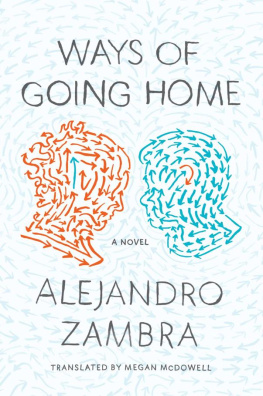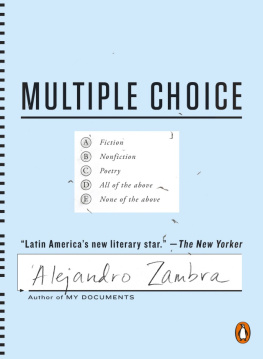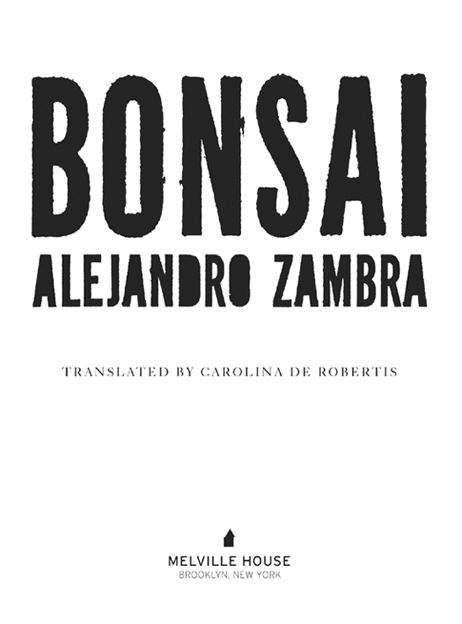Praise for BONSAI
Zambras book has already been canonized as a new classic.
VARIETY
A delightful work. A love story thats both wry and melancholy Zambra is indeed the herald of a new wave of Chilean fiction.
MARCELA VALDES, THE NATION
Undeniably fascinating. The kind of story that lingers in the mind for weeks after being read.
ELIZABETH WADELL ,
THE QUARTERLY CONVERSATION
Bonsai won the Chilean Critics Award for best novel of the year and its easy to understand why.
JONATHAN MESSINGER ,
TIME OUT CHICAGO
One of the greatest literary events of recent years.
ALFONSO CORTNEZ ,
LAS LTIMAS NOTICIAS
The publication of Bonsai marked a kind of bloodletting in Chilean literature. It was said (or argued) that it represented the end of an era, or the beginning of another, in the nations letters.
MERCURIO
An unclassifiable object of unusual beauty one of the best Chilean novels of recent times.
DAVID LACALLE, CAPITAL
Bonsai is an appealing miniature, a novella that, despite its brevity, feels airy and full an enjoyable, pleasantly surprising, and clever read.
THE COMPLETE REVIEW
What is remarkable about Zambras novella is the space between ending and beginningthe progressive prose that relates a true story with emotional and artistic implications extending far beyond its 83 pages.
BOOKSLUT
Zambra flexes some serious artistic muscle.
RAIN TAXI
a complex and sophisticated story.
THE PHOENIX (PA)
First published in Spanish as Bonsi (Anagrama).
Copyright Alejandro Zambra
Translation Carolina De Robertis 2008
Cover photo courtesy of Network Releasing
First Melville House Printing: October 2008
Melville House Publishing
145 Plymouth Street
Brooklyn, NY 11201
www.mhpbooks.com
The Library of Congress has cataloged the
paperback edition of this book as follows:
Zambra, Alejandro, 1975
[Bonsi. English]
Bonsai / by Alejandro Zambra; translated from the Spanish by Carolina de Robertis.
p. cm.
eISBN: 978-1-61219-161-4
I. Robertis, Carolina de. II. Title.
PQ8098.36.A43B6513 2008
863.7dc22
2008009938
v3.1
For Alhel
Years passed, and the only
person who didnt change was
the young woman in the book.
Yasunari Kawabata
Pain is measured and detailed.
Gonzalo Milln
TABLE OF CONTENTS
I. MASS
In the end she dies and he remains alone, although in truth he was alone some years before her death, Emilias death. Lets say that she is called or was called Emilia and that he is called, was called, and continues to be called Julio. Julio and Emilia. In the end Emilia dies and Julio does not die. The rest is literature:
The first night they slept together was an accident. They had an exam in Spanish Syntax II, a subject neither of them had mastered, but since they were young and in theory willing to do anything, they were willing, also, to study Spanish Syntax II at the home of the Vergara twins. The study group turned out to be quite a bit larger than imagined: someone put on music, saying he was accustomed to studying to music, another brought vodka, insisting that it was difficult for her to concentrate without vodka, and a third went to buy oranges, because vodka without orange juice seemed unbearable. At three in the morning they were perfectly drunk, so they decided to go to sleep. Although Julio would have preferred to spend the night with one of the Vergara sisters, he quickly resigned himself to sharing the servants quarters with Emilia.
Julio didnt like that Emilia asked so many questions in class, and Emilia disliked the fact that Julio passed his classes while hardly setting foot on campus, but that night they both discovered the emotional affinities that any couple is capable of discovering with only a little effort. Needless to say, they did terribly on the exam. A week later, for their second chance at the exam, they studied again with the Vergaras and slept together again, even though this second time it was not necessary for them to share a room, since the twins parents were on a trip to Buenos Aires.
Shortly before getting involved with Julio, Emilia had decided that from now on she would follar, as the Spanish do, she would no longer make love with anyone, she would not screw or bone anybody, and much less would she fuck. This is a Chilean problem, Emilia said, then, to Julio, with an ease that only came to her in the darkness, and in a very low voice, of course: This is a problem for Chilean youth, were too young to make love, and in Chile if you dont make love you can only fuck, but it would be disagreeable to fuck you, Id prefer it if we shagged, si follaramos, as they do in Spain.
At that time Emilia had never been to Spain. Years later she would live in Madrid, a city where shed shag quite a bit, though no longer with Julio, but rather, mainly, with Javier Martnez and with ngel Garca Atienza and with Julin Alburquerque and even, but only once, and under some pressure, with Karolina Kope, her Polish friend. On this night, this second night, on the other hand, Julio was transformed into the second sexual partner of Emilias life, into, as mothers and psychologists say with some hypocrisy, Emilias second man, while Emilia in turn became Julios first serious relationship. Julio avoided serious relationships, hiding not from women so much as from seriousness, since he knew seriousness was as dangerous as women, or more so. Julio knew he was doomed to seriousness, and he attempted, stubbornly, to change his serious fate, to pass the time waiting stoically for that horrible and inevitable day when seriousness would arrive and settle into his life forever.
Emilias first boyfriend was dim, but there was authenticity in his dimness. He made many mistakes and almost always knew enough to acknowledge them and make amends, but some mistakes are impossible to make amends for, and the dim one, the first one, made one or two of those unpardonable mistakes. Its not even worth mentioning them.
Both of them were fifteen years old when they started going out, but when Emilia turned sixteen and seventeen the dim one was still fifteen. Thats how it went: Emilia turned eighteen and nineteen and twenty-four, and he was fifteen; twenty-seven, twenty-eight, and he fifteen, still, until her thirtieth, since Emilia did not keep having birthdays after thirty, and not because she at that point decided to conceal her age, but rather because a few days after turning thirty Emilia died, and so she no longer turned older because she began to be dead.
Emilias second boyfriend was too white. With him she discovered mountaineering in the Andes, bicycle rides, jogging, and yogurt. It was, in particular, a time of a lot of yogurt, and this, for Emilia, turned out to be important, because she was emerging from a period of a lot of pisco, of long and complicated nights of pisco with Coca-Cola and pisco with lemon, and also of pisco straight up, dry, no ice. They groped each other a lot but never arrived at coitus, because he was very white and this made her distrustful, despite the fact that she herself was very white, almost completely white, with short hair that was very black, she did have that.
The third one was, in fact, a sick man. From the start she knew the relationship was doomed to failure, but even so they lasted a year and a half, and he was her first sexual partner, her first man, when she was eighteen, and he was twenty-two.














